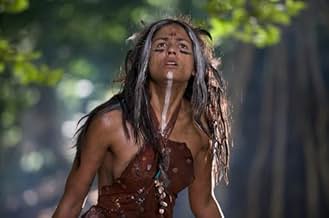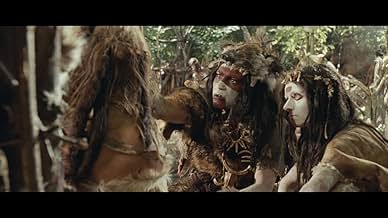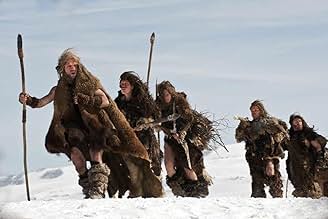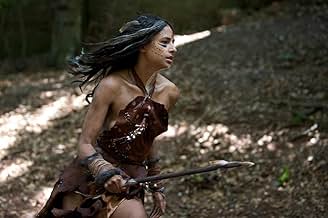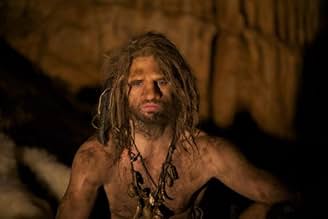Ao, le dernier Néandertal
- 2010
- 1h 24m
When his clan, including his wife and baby girl Néa, are massacred, Ao, a desperate Neanderthal, decides to leave the North country where he has been living for the South where he was born. ... Read allWhen his clan, including his wife and baby girl Néa, are massacred, Ao, a desperate Neanderthal, decides to leave the North country where he has been living for the South where he was born. His aim is to join his twin brother, from whom he was separated when he was nine. On his l... Read allWhen his clan, including his wife and baby girl Néa, are massacred, Ao, a desperate Neanderthal, decides to leave the North country where he has been living for the South where he was born. His aim is to join his twin brother, from whom he was separated when he was nine. On his long and adventurous way home, he meets Aki, a Homo sapiens woman.
- Homo Sapiens ( killer of AO's family )
- (as Nazim Mununov)
Storyline
Did you know
- TriviaWith the exception of one short sequence featuring bees, only living animals appear, including the frightening white she-bear.
- ConnectionsReferenced in Movie Friends: Prashant Prabhakar (2013)
This film's story starts out like any other for the genre, in the average ordinary life of a Neanderthal man who's being a good provider for his tribe's people by heading out on hunting-gathering quests. On top of all that, he recently became a doting father after his loyal mate gives birth (aw!). However, a sudden unprecedented attack on his people results in the genocidal slaughtering of his family (including his newborn child). This uncalled for assault was calculated by a scouting-party of cruel Cro-Magnon hunters that happened to stumble across the nearby hideout spot at their cave's entrance, which just goes to shows that even back then (thousands and thousands of years ago) there were very unjust conflicts between different human races for no apparent reason; other than the obvious fact that they were different. In the shocking aftermath of this brutally traumatic act which has fallen upon his once peaceful and disrupted lifestyle, not all is calm for his now scarred psyche as he contemplates about traversing back to the previous homeland of his old life (wherein his original family roots lie) whilst seething in a depressed state-of-mind. The movie does a nice job at chronicling this lonesome individual's odyssey on his exhaustingly long trek, navigation his way through the desolate mountainous valleys; all of which leads to some misadventures when he bumps into yet another tribal group, one that's more advanced but seemingly less-hostile. Will he have difficulty getting on with these strangers, or will things turn out alright for the poor fella in the end? (you'll just have to go and watch it for yourself to find out).
The scenery isn't anything superb and it's far from a showcase of stunning visuals, but the cinematography nonetheless gets the job done of being effective enough to keep one's attention (on a certain level, that is). I'm not entirely sure if the director watched Quest for Fire to do prep work for this movie, but in any case it greatly adheres to that film in-particular by having the same style of presentation, even more so than something like Clan of the Cave Bear. Also, even though the film doesn't have much to offer when it comes to prehistoric beasts, I'll forgive its lack of them for understandable reasons (mostly budgetary limitations). Something I really like and admire about all these types of movies is the fact that no matter where you are in the world (whether that be Western America or Eastern Asia, for example), the simple stories are still understandable and most of all you're still able to follow them quite easily without the aide of subtitles; thanks to the actors' facial-expressions, hand-gestures, body-movements and vocal-grunts. It's basically like a universal language that almost all of us can relate to, at least to some mild degree. No matter what dialect you may speak or what country you live in, it's inclusive to literally everyone on a worldwide scale. I'm sure it was no easy task on the performers' part because in order to pull this off and make it as convincing as possible, they had to arduously master the dying art of silent acting (a most impressive feat indeed).
Now then, on to a few of my nitpicks with the film's more technical aspects. Some of the compositing shots weren't very convincing, like the bear fight with Ao earlier on in the movie and a bison stampede he's trying to get clear from at some point later on (NOT a major story spoiler). The compositing in both of these sequences make the scenes feel slightly awkward to watch, because your brain's constantly alerting you to the fact that it's pretty obvious the two completely separate shots don't match-up perfectly together (they're not aligned properly, in other words). When you see the two aforementioned sequences for yourself, you'll notice how the scenes in question can be kind of disorienting at minor points with their rapid-fire editing, only making them last on-screen for a fraction of a few seconds at most. My guess is that they knew these already shot scenes didn't turn-out so well and I'm only assuming there was no time to reschedule for some major reshoots with alternate takes, which would most definitely explain why the editors frequently made the quick-cut edits in the way that they did as to compress the duration of the scenes' length down by just a bit. I'd say a little more superimposing work was needed to be done in order to make these loosely-edited scenes come-off less disjointed and appear more in-synchronisation with one another.
So all in all, I thought Ao: The Last Hunter was pretty darn good. The only slight negative I'd give this is that it's yet another one of these prehistorical adventure films that's set in Palaeolithic Europe, for the billionth time. I suppose it's because these filmmakers don't want to deviate or stray too far from this tried-and-tested formula. It's almost as if they're making a conscious effort on their part to play-it-safe by going down the conventional route and staying away from anything that'd be considered too niche for the mainstream public. Quest for Fire and Alpha were also set in Palaeolithic Europe, two quintessential crowning achievements I hold in high-regard as being a couple of the greatest, most authentic caveman motion-pictures ever conceived by modern mankind. But just for once, it'd be nice to see an ancient period piece that isn't confined to this one certain pre-historical location. Often times I keep thinking back to Missing Link (1988), which tackled the primordial beginnings of our extremely ancient ancestors in Pliocene Africa. With that movie, they were adventurous and willing to take a chance by setting their film's story elsewhere. In my mind, I can perfectly envisage an epic prehistorical film set in the Pleistocene Epoch of either North America, Asia or Australia. I really think there's a lot of untapped potential to be had with those overlooked ideas, having endless story possibilities.
- walkingwithprimeval
- Mar 19, 2022
- Permalink
Details
- Release date
- Country of origin
- Languages
- Also known as
- Ao: The Last Hunter
- Filming locations
- Bulgaria(scenes in the caves)
- Production companies
- See more company credits at IMDbPro
Box office
- Budget
- €14,000,000 (estimated)
- Gross worldwide
- $1,669,603
- Runtime1 hour 24 minutes
- Color
Contribute to this page




